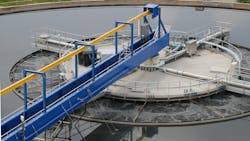ASCE report card gives Iowa’s wastewater infrastructure a C-
The Iowa Section of the American Society of Civil Engineers (ASCE) has released the 2023 Report Card for Iowa’s Infrastructure.
The card rated the state’s Wastewater as C-, Stormwater as D+, and Drinking Water as C.
Overall, the 13 categories of Iowa’s report card received an average C grade – the same as ITS 2019 report card.
Iowa’s overall grade is better than the national grade of C- from the 2021 Report Card for America’s Infrastructure. Nine of the 13 categories in the Iowa Report Card have better grades from the national assessment.
The categories assessed in the report include: Aviation (C-), Bridges (D+), Dams (D), Drinking Water (C), Energy (C+), Inland Waterways (D+), Levees (C), Public Parks (C), Rail (C+), Roads (B-), Solid Waste (B-), Stormwater (D+), and Wastewater (C-).
“This report underscores the challenges and successes of Iowa’s infrastructure,” said Edward Sowder, PE, president of the American Society of Civil Engineers – Iowa Section, and project engineer with Calhoun-Burns & Associates, West Des Moines. “Challenges include aging assets, inflation, supply chain woes, and a significant rural population, and extreme weather events - flooding in particular.”
As of March 2023, the 2021 federal Infrastructure Investment and Jobs Act has provided $2.4 billion to Iowa, including $316 million for Missouri River navigation improvements. But money from that Bipartisan Infrastructure Law is temporary. Further state and local investment, plus policy changes and improved project delivery, are needed to ensure the high performance of Iowa’s infrastructure systems.
“Infrastructure investment means more jobs, safer communities, and more money in taxpayers’ wallets,” Sowder said. “Iowa families and businesses cannot afford to underinvest in the systems that get us to and from work, send water directly to our faucets, and keep the lights on. We all pay a hidden tax for faulty infrastructure – the more we invest the less it costs us in the long run.”
The report also found that severe weather events are increasing in Iowa, and the systems that protect residents and property are aging and aren’t equipped to handle current and future rainfall trends, threatening residents’ safety and welfare. Iowa has had the most disaster declarations due to flooding over the past 70 years of any state, and rainfall and flooding has increased by 20% in the last century. This is overwhelming infrastructure systems and decimates agricultural output. Although sectors have taken steps to combat advanced rainfall patterns, ASCE says that more must be done to mitigate risks associated with climate disasters and flooding.
The report card also came with a set of recommendations for the state’s infrastructure, with one directly concerning water infrastructure:
Fortify water systems for greater resilience: Iowa sits between nationally important rivers with integral freight capacity, vital ecosystems, and powerful economic potential. From 1953 to 2018, Iowa had more disaster declarations due to flooding than any other state in the nation — a trend that’s likely to continue. Resilience can’t be addressed without greater investment in aging systems for wastewater, drinking water, stormwater, dams, and levees often under-capacity for treatment and conveyance.
